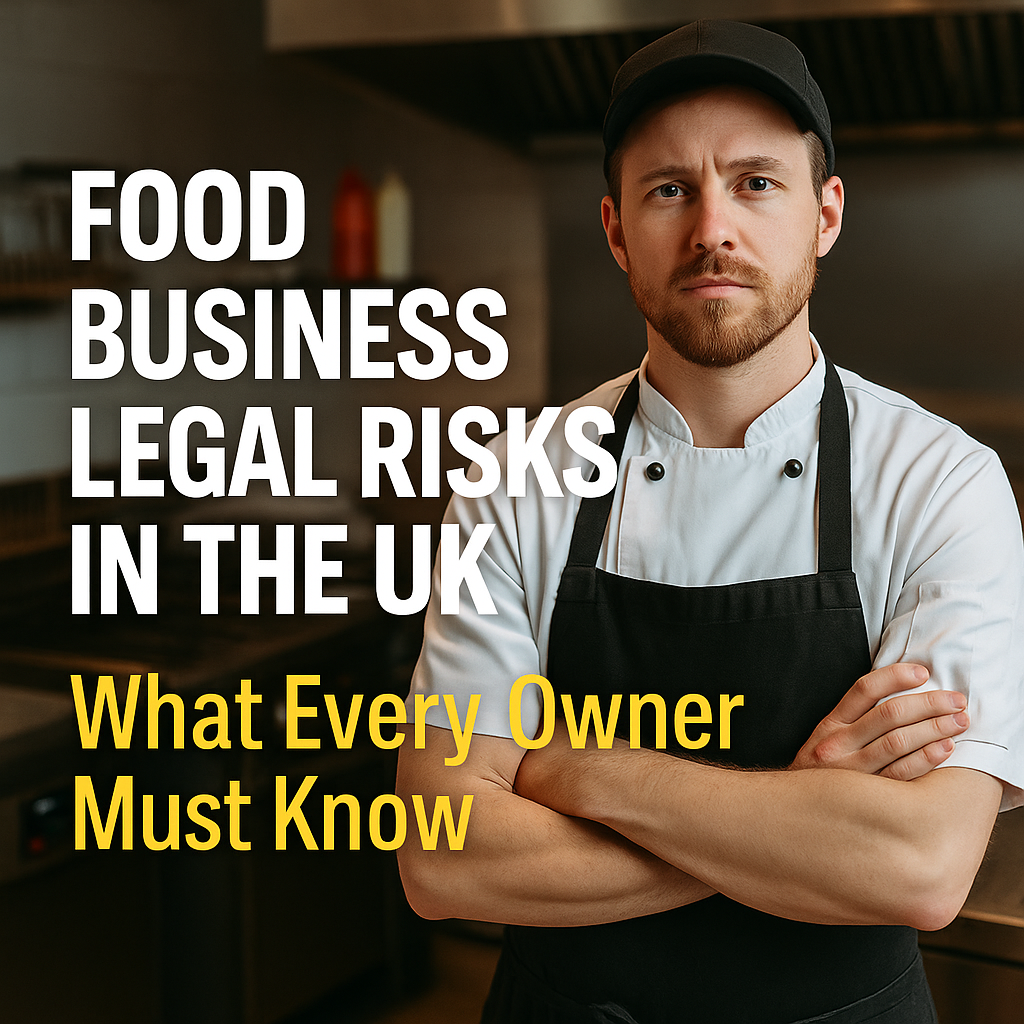Your cart is currently empty!
Food Business Legal Risks in the UK: What Every Owner Must Know

Starting a food business in the UK can be exciting and financially rewarding. Whether you’re running a small takeaway, a cloud kitchen, or a dine-in restaurant, the opportunity to build something of your own is appealing. However, many new owners underestimate the legal responsibilities involved—especially those who lack prior experience in food hygiene or workplace health and safety.
This blog explores real legal cases where food business operators faced fines and prosecution due to lapses in food hygiene and health and safety compliance. We’ll break down the exact failings, what laws were breached, and how these situations could have been avoided with proper systems and training.
Case Study 1: Manchester Restaurant Owner Fined £12,000 for Food Hygiene Failures
In May 2024, environmental health officers visited a newly established restaurant in Manchester following complaints from customers. The inspection uncovered:
- Rodent droppings in the kitchen
- Raw chicken stored next to ready-to-eat food
- A complete lack of temperature logs or cleaning records
- No HACCP (Hazard Analysis and Critical Control Point) system in place
- Untrained staff handling food and allergens
Legal Breaches:
- Food Safety Act 1990
- Regulation (EC) No. 852/2004 on hygiene of foodstuffs
Consequences:
- £12,000 fine
- 3-month suspended sentence
- Reputation damage and loss of business
How It Could Have Been Avoided:
- Implementing a documented HACCP plan
- Training staff in Level 2 Food Hygiene
- Keeping cleaning schedules, temperature records, and pest control reports
- Registering with the local authority and passing the initial EHO inspection
This case shows that without basic food safety procedures, even a new business can be penalised heavily. Ignorance of the law is not a defence.
Case Study 2: Takeaway in Birmingham Fined £18,000 Over Employee Burn Injury
In late 2023, an employee at a small takeaway suffered serious burns when a fryer tipped over during cleaning. An investigation found that:
- The fryer had a faulty leg and had not been inspected or maintained
- There were no documented risk assessments
- Staff were not trained in manual handling or burn first aid
- No safety signage or personal protective equipment (PPE) was available
Legal Breaches:
- Health and Safety at Work etc. Act 1974
- Management of Health and Safety at Work Regulations 1999
Consequences:
- £18,000 fine
- Mandatory business closure until a full safety audit was completed
- Compensation claim by injured employee
How It Could Have Been Avoided:
- Conducting a risk assessment on kitchen equipment and cleaning procedures
- Providing training on burns first aid and manual handling
- Maintaining equipment regularly with documented checks
- Ensuring PPE such as gloves and aprons were available
This example highlights the need for workplace safety even in small, owner-run food businesses.
Top Legal Risks for New Food Business Owners in the UK
- Lack of HACCP or Food Safety Management System
- Required by law under Regulation (EC) No. 852/2004
- Identifies food safety hazards, control measures, and monitoring steps
- No Staff Training or Records
- Food handlers must be trained in hygiene and allergen safety
- Natasha’s Law requires clear labelling and control of allergens
- No Health and Safety Policy or Risk Assessments
- Even sole traders must identify workplace hazards
- Fire safety, slips, trips, manual handling, and equipment use must be assessed
- Pest Control Failures
- Rodents or insects can lead to immediate closure
- Regular pest control contracts and hygiene logs are critical
- Poor Fire Safety Preparedness
- Regulatory Reform (Fire Safety) Order 2005 applies to all premises
- Requires fire risk assessment, extinguishers, and staff awareness
How to Stay Compliant: A Practical Guide
- Register your food business with the local authority at least 28 days before opening
- Create a HACCP-based food safety system using templates or a consultant
- Train all staff in food hygiene, allergens, fire safety, and basic first aid
- Conduct risk assessments and review them regularly (kitchen layout, fire exits, equipment)
- Keep documentation: cleaning logs, temperature charts, training records, pest control visits
- Display a food hygiene rating after inspection and work toward a 5-star rating
How Safe-Comply Can Help
At Safe-Comply, we help new and small food businesses become inspection-ready. Our templates and guides are designed to save time while ensuring you meet UK food and workplace safety laws.
- Ready-to-use HACCP templates
- Printable food safety checklists
- Simple risk assessment forms
- Compliance starter kits for Level 2 Food Hygiene, Fire Safety, and more
[Download our Free Starter Compliance Pack]
Conclusion
Running a food business in the UK carries significant legal responsibilities. The fines and court cases we’ve seen above show that health and safety laws apply to all businesses—regardless of size, experience, or intention.
With the right systems, training, and documentation in place, these risks can be controlled or completely avoided. Investing in compliance is not just about ticking boxes—it’s about protecting your customers, your staff, and your livelihood.
Leave a Reply